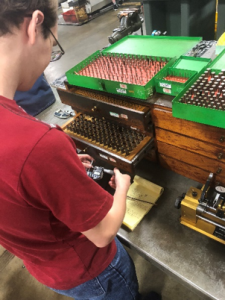My name is Joel Bailey and I am from Indianapolis, Indiana, and I am a rising sophomore. I am currently interested in being a Mathematics major when I declare a major in the fall of 2018. My internship this summer was at Connecta Corporation, a small company in Indianapolis that produces precision turned parts for aerospace, electronics, and other industries. There were a variety of tasks and projects to complete from reorganizing hundreds of machine parts to heat treating; I didn’t take any particular role in the company.
My first project this summer was reorganizing the company’s large catalogue of collets, which the company uses to hold the raw material while a machine turns the material. There were hundreds of collets to sort through in nine different drawers; many were misplaced, and several were missing. The challenge with this project was that even small mistakes were big set backs for me; whenever I accidently skipped over a collet (which I did multiple times), I had to redo part of my organization to include that skipped collet. It was an interesting project for someone like me who likes thinking about systems and organization, but it definitely took a lot of patience.
 Another project I worked on was preparing a new metal plate for heat treatment. Connecta received an order that required a plate to “pinch” the end of a small part in a hole at a certain angle, but the plate had to hold over a thousand of these parts. The only plate we had that had the correct hole sizes in the plate could only hold about fifty of these parts, so we had to order a much larger plate and make the holes ourselves and proceed with the order. Using some trigonometry, I compared the theoretical angle of the treated part based on its drawing and the actual measured angle of some test parts to verify that the old plate had the correct hole size. The angles matched within a margin of error, so I proceeded to make equations to determine the size of a plate that could have x number of holes. Once that was complete, I ordered the right size plate, and let the company take care of the rest. It was pretty cool to be able to exercise my math skills in a real life scenario.
Another project I worked on was preparing a new metal plate for heat treatment. Connecta received an order that required a plate to “pinch” the end of a small part in a hole at a certain angle, but the plate had to hold over a thousand of these parts. The only plate we had that had the correct hole sizes in the plate could only hold about fifty of these parts, so we had to order a much larger plate and make the holes ourselves and proceed with the order. Using some trigonometry, I compared the theoretical angle of the treated part based on its drawing and the actual measured angle of some test parts to verify that the old plate had the correct hole size. The angles matched within a margin of error, so I proceeded to make equations to determine the size of a plate that could have x number of holes. Once that was complete, I ordered the right size plate, and let the company take care of the rest. It was pretty cool to be able to exercise my math skills in a real life scenario.
My biggest take-away from this experience is that there is always something to do in the workplace. While organizing the collets was a big and important job, there were always smaller things that needed to be done, such as cleaning up a work space or updating an old document. Working in a smaller company presented a lot of tasks that needed to be done; a larger company may ignore smaller jobs, but that isn’t really possible in a small company.